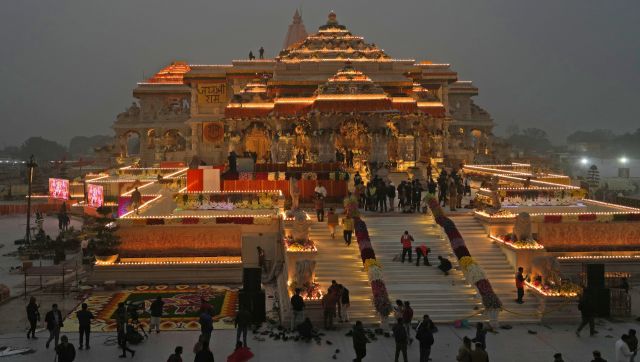Former Infosys CEO and chairperson of the Unique ID project Nandan Nilekani has criticised the Anna Hazare-led campaign as a “naïve” way to tackle corruption, and suggests that a Lokpal Bill can be only one of many instruments to combat corruption.
In an interview to CNN-IBN’s Sagarika Ghose, Nilakeni said that tackling corruption needed to be done in a “more holistic and strategic manner.”
The Jan Lokpal Bill is “absolutely not” a magic wand against corruption, Nilekani said emphatically. “I don’t know who is drinking this Kool-Aid. The notion that you pass some magical bill and corruption will go away is simplistic… That’s certainly not the way you should be thinking about this issue. “
“Áll of us want to do things to eliminate corruption in society and I fully sympathise with that motive and that frustration that people feel about corruption… But if you are going to do something about corruption, we have to do it in a much more broad-based manner in which this Lokpal Bill becomes one of many things.”
Nilekani stressed that he wasn’t saying there isn’t a need for a Lokpal Bill. “I’m just saying that a bill where you create a whole police infrastructure to eliminate corruption - without looking at the whole broad set of issues and fundamentally changing the way we deliver public services… That’s focussing on a very small part of the overall problem.”
“I’m very much for removing corruption, but the statement that this is the only way to do it to the exclusion of all other things is very, very impractical,” he added.
More from Nilekani:
Fixing the real problems
“For millions of people in India, corruption happens at the point of interaction, when they’re trying to access the Public Distribution System (PDS), or their pension or trying to open a bank account opened, when they move from the village to the city and nobody recognises them… That’s where corruption happens. And that’s where the things that we’re doing - giving an Aadhar ID for everyone, getting them bank accounts through an automatic KYC (Know Your Customer) – become important. It’s those millions of interactions that people have in the system that need to be fixed.”
On the middle class anger
What we’re witnessing (the middle class protests) is a revolution of rising expectations, and part of their demand is for a much better, more streamlined, level playing field kind of society, which all of us will agree with. So, the aspiration and the frustration is something I fully empathise and sympathise with. Where I have a difference is with the solution being offered and the means being adopted.
All the people who are against corruption should have a much broader agenda which covers at least 10 to 15 things, one of which is the Lokpal Bill.
On whether economic liberalisation is feeding corruption
No, I think we need more reforms. There are parts of the Indian economy that don’t deal with the state much, but the challenge happens where there is a huge role of government, whether as regulator or provider of scarce resources or whatever…. That interphase is where all the issue rise. That has to be made more transparent and deregulated. We need much more liberalisation. We’re going to have millions of young Indians coming into the workforce… and the jobs for those Indians are going to be created by entrepreneurs. We need more reforms , not less. You have to streamline things, automate things, and provide choice. Choice is what empowers.
On whether a Lokpal is needed to tackle big ticket corruption
Of course we need a Lokpal - although I don’t know which version of the Bill is right. I’m not an authority on that. I’m just saying a Lokpal is one of 10 or 15 initiatives we need to take. We should see this in that context - as a strategic, holistic transformation that challenges and cuts across large ticket items, retail items… whatever. Don’t focus on one out of 15 things and act as if that is a magical bullet that will solve everything. That’s completely inane.
I’ve been trying to do this system stuff for many years , and I’m convinced that you have to look at it strategically.
On whether he thinks Anna Hazare’s protest is justified
I dont think it’s justified. Consider this: We have a bill for the Unique ID authority that was placed before parliament and went to the Standing Committee for Finance. I’ve had the chance to make presentations before it on more than one occasion. The proceedings are confidential, but let me tell you that they do an extraordinarily thorough job. I’m very impressed with the quality of the questions, the homework, the due diligence – and it’s all bipartisan: you don’t know who is from which party.
When you have such an excellent and comprehensive system of lawmaking, and when (the Lokpal Bill) is before an appropriate standing committee, why do we need an agitation? It just escapes me why this is going on.
When a very serious parliamentary body has taken it up for consideration, why are we not working through that system?
I have visited Parliaments in the UK, the US and France; I’ve met with top leaders across the world. The standing committee procedures are second to none. Let us respect that
On the perception that all politicians are corrupt
It is a very unfair statement. I’ve been in public life for two years and my respect for politicians has gone up . I think they are extremely hardworking…
If the argument is that some politicians are corrupt, we can say that of every walk of life: businessmen, media houses, the bureaucracy, NGOs… So why target only one constituency? We have to respect our politicians. Watch the Video interview:


)




)
)
)
)
)
)
)
)